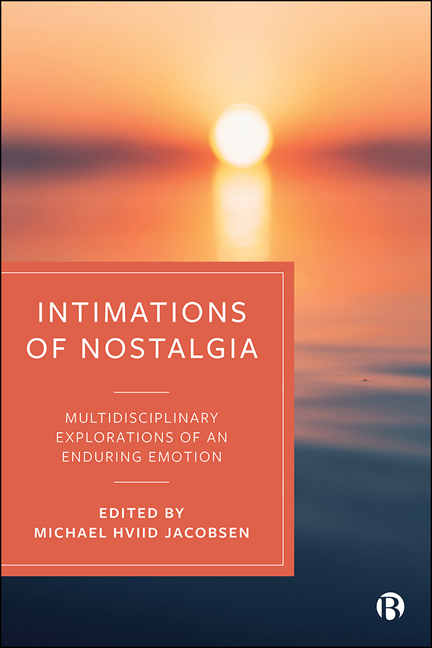Book contents
- Frontmatter
- Contents
- Notes on Contributors
- Preface and Acknowledgements
- Introduction: The Many Different Faces of Nostalgia – Exploring a Multifaceted and Multidisciplinary Emotion
- 1 Philosophy and Nostalgia: ‘Rooting’ within the Nostalgic Condition
- 2 History and Nostalgia: Historicizing a Multifaceted Emotion
- 3 Political Theory and Nostalgia: The Power of the Past in the History of Political Thought
- 4 Sociology and Nostalgia: Micro-, Meso-and Macro-level Dimensions of an Ambiguous Emotion
- 5 Psychology and Nostalgia: Towards a Functional Approach
- 6 Anthropology and Nostalgia: Between Hegemonic and Emancipatory Projections of the Past
- 7 Media Studies and Nostalgia: Media Philosophy and Nostalgizing in Times of Crisis
- 8 Marketing and Nostalgia: Unpacking the Past and Future of Marketing and Consumer Research on Nostalgia
- 9 Literature and Nostalgia: Vestiges of Paradise
- 10 Architecture and Nostalgia: The End of History, the End of the Future and the Prospect of Nostalgia
- Postscript: On Nostalgia of the Future and the Future of Nostalgia – Some Scattered Concluding Observations
- Index
9 - Literature and Nostalgia: Vestiges of Paradise
Published online by Cambridge University Press: 13 May 2022
- Frontmatter
- Contents
- Notes on Contributors
- Preface and Acknowledgements
- Introduction: The Many Different Faces of Nostalgia – Exploring a Multifaceted and Multidisciplinary Emotion
- 1 Philosophy and Nostalgia: ‘Rooting’ within the Nostalgic Condition
- 2 History and Nostalgia: Historicizing a Multifaceted Emotion
- 3 Political Theory and Nostalgia: The Power of the Past in the History of Political Thought
- 4 Sociology and Nostalgia: Micro-, Meso-and Macro-level Dimensions of an Ambiguous Emotion
- 5 Psychology and Nostalgia: Towards a Functional Approach
- 6 Anthropology and Nostalgia: Between Hegemonic and Emancipatory Projections of the Past
- 7 Media Studies and Nostalgia: Media Philosophy and Nostalgizing in Times of Crisis
- 8 Marketing and Nostalgia: Unpacking the Past and Future of Marketing and Consumer Research on Nostalgia
- 9 Literature and Nostalgia: Vestiges of Paradise
- 10 Architecture and Nostalgia: The End of History, the End of the Future and the Prospect of Nostalgia
- Postscript: On Nostalgia of the Future and the Future of Nostalgia – Some Scattered Concluding Observations
- Index
Summary
Introduction
We have all experienced nostalgia, that peculiarly painful but nonetheless irresistible sensation of not just remembering the past, but of dwelling on it, circling around it and experiencing again its bittersweet, close-yet-distant otherness. We may be nostalgic for our personal pasts – remembering a golden sun-soaked day of childhood or a beloved city lived and left behind – or for collective memories – a moment of national celebration, an old television series or even a whole historical era. Yet, despite this ubiquity, nostalgia has long had, and retains, a slightly disreputable air, and even a taint of the sickroom. We may be nostalgic, but we are embarrassed to be so. This is unfortunate, as nostalgia's cognitive and affective patterns not only are vital to the psychic economies of individuals and communities but also play an important role in our cultural life.
If art is in many of its forms a recording, representation or reimagination of past events, it is no surprise that nostalgia is one of its primary emotional modes. Roland Barthes, for example, has argued that ‘every photograph is a certificate of presence’, but of a presence from the past, ‘an emanation of past reality: a magic, not an art’, and this magical relationship between past and present is as good a way as any of thinking about the uncanny power of nostalgia (Barthes 2000: 87). The relationship between nostalgia and literature is, however, particularly close, and the contributions nostalgia makes to literature are particularly vital. This is in part, as we will argue here, because writing itself is an inherently nostalgic activity that records otherwise ephemeral moments for posterity. It thus always carries with it the potential to generate an emotional response to the past. In part, it is because modern literature has been largely shaped by a powerful tension between an attraction to the past and an equally powerful drive towards the future. And in part, it is because many forms of literature, from many different historical and cultural contexts, have found that the ‘remembrance of things past’ (Shakespeare 1978: 42) offers an inexhaustible and endlessly fertile source of images, and a powerful emotional reservoir. Indeed, however far back we look, we find that literature deals, by no means exclusively, but persistently and repeatedly, with an evocation of past experience that can be considered under the rubric of nostalgia.
- Type
- Chapter
- Information
- Intimations of NostalgiaMultidisciplinary Explorations of an Enduring Emotion, pp. 191 - 210Publisher: Bristol University PressPrint publication year: 2021



